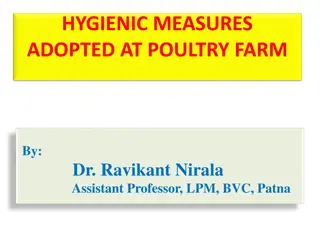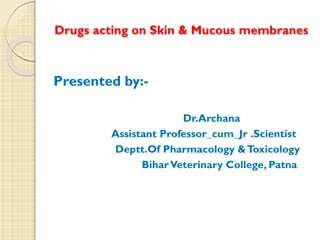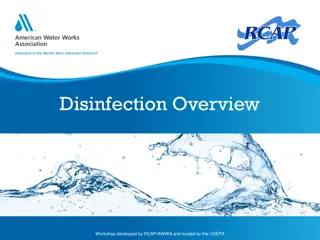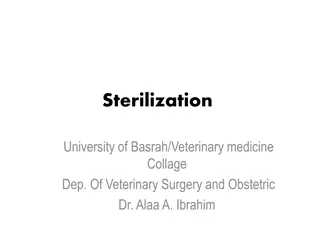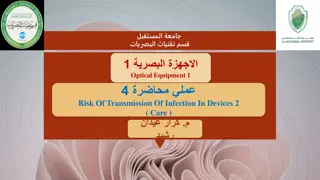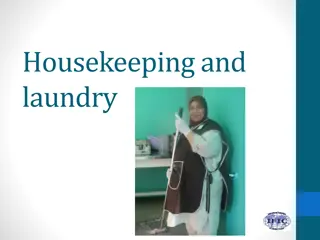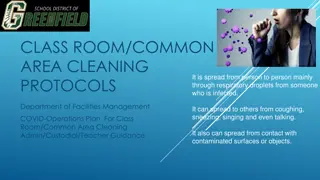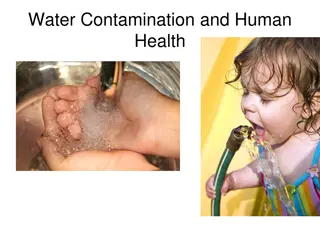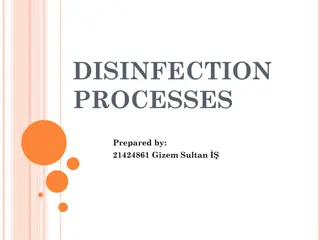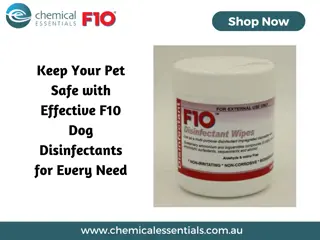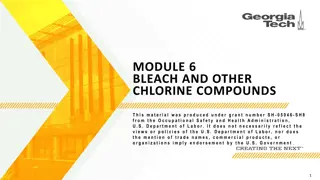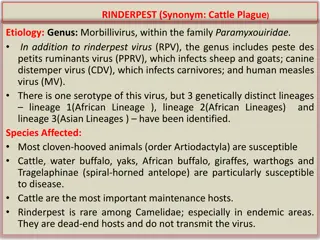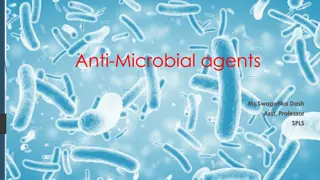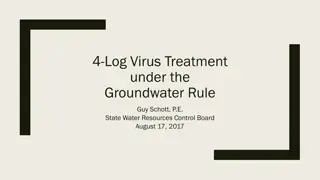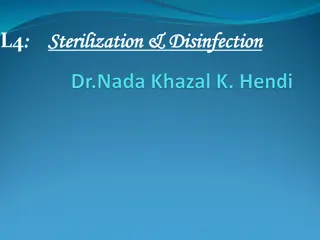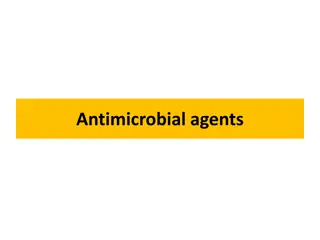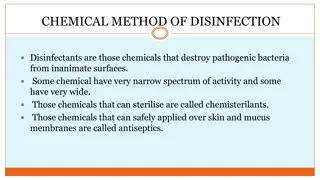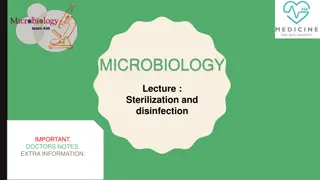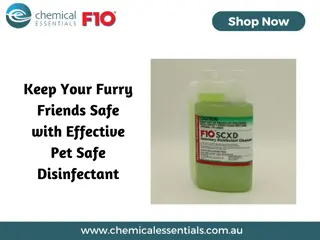Overview of Medical Devices Regulations in India
The Medical Devices Rules of 2017 in India categorize medical devices into broad classifications, including electronics equipment, implants, consumables, IVD reagents, and surgical instruments. These rules apply to substances used for diagnosis, surgical dressings, contraceptives, disinfectants, and
4 views • 33 slides
Hygienic Measures for Poultry Farm Management
Poultry waste management, farm hygiene, sanitation, and environmental issues are critical for maintaining a healthy poultry farm. Disinfection, while important, is not a substitute for cleanliness. Effective disinfectants should have good germicidal activity, be non-toxic to humans and birds, work o
0 views • 18 slides
Overview of Drugs Acting on Skin & Mucous Membranes
This presentation discusses different classes of drugs that act on the skin and mucous membranes, including emollients, demulcents, adsorbents, protectives, astringents, counterirritants, keratolytics, and skin disinfectants. Emollients soften and moisturize the skin, demulcents soothe irritation in
3 views • 10 slides
Comprehensive Overview of Water Disinfection and Chlorination Basics
This workshop explores the importance and various methods of water disinfection, focusing on chlorination basics, chloramines, disinfection types, and the impacts of pH on chlorine disinfection. Learn about the necessity of disinfection in water systems, different disinfectants used, and the need fo
0 views • 37 slides
Guidelines on Sterilization, Disinfection, and Types of Disinfectants in Veterinary Medicine
Sterilization is the process of eliminating all microorganisms from an object, while disinfection reduces the number of pathogenic microorganisms on surfaces. Various types of disinfectants exist, including high-level, intermediate-level, and low-level options. Different equipment items in veterinar
0 views • 18 slides
Proper Care and Maintenance of Optical Equipment to Prevent Infections
Regular examination and proper cleaning of tonometer prisms are essential to reduce the risk of transmitting infections during eye examinations. Disinfection and sterilization processes are crucial in maintaining optical equipment hygiene. Different disinfectants and physical methods can be used to
0 views • 24 slides
Understanding Infection Prevention and Control in Housekeeping and Laundry Settings
This educational material covers the crucial role of infection prevention and control in environmental services, housekeeping, and laundry settings. Key topics include cleaning practices, sources of infection, the importance of the environment, and the use of disinfectants. It emphasizes the signifi
0 views • 28 slides
Enhanced Cleaning Protocols for Classrooms and Common Areas
Spread through respiratory droplets, COVID-19 requires rigorous cleaning protocols in class and common areas. Key measures include mandatory mask-wearing, hand sanitizing, physical distancing, and regular surface cleaning using alcohol wipes and disinfectants. Classroom staff play a crucial role in
0 views • 5 slides
Water Contamination and Human Health: Causes, Types, and Examples
Water contamination poses a significant risk to human health, caused by various pollutants such as microorganisms, chemicals, industrial wastes, and sewage. Common sources include human and animal sewage, industrial emissions, pesticides, and agricultural runoff. Different types of contaminants incl
0 views • 25 slides
Understanding Disinfection Processes and Mechanisms
Disinfection is the process of partially destroying disease-causing organisms, different from sterilization where all organisms are destroyed. Various mechanisms of disinfectants include damaging cell walls, altering permeability, and inhibiting enzyme activity. Chemical and physical agents such as
0 views • 24 slides
Keep Your Pet Safe with Effective F10 Dog Disinfectants for Every Need
A clean, germ-free environment is essential for your dog\u2019s health. With Chemical Essentials\u2019 high-quality dog disinfectants, you can easily sanitise surfaces, equipment, and air spaces. \n\nPowered by Benzalkonium chloride and Polyhexamethy
1 views • 3 slides
Understanding Bleach and Chlorine Compounds in Cleaning
Bleach and chlorine compounds are commonly used disinfectants with varying concentration ranges. They are effective at killing bacteria, fungi, and viruses, but require specific pH and concentration levels for optimal performance. Chlorine gas is particularly useful for sanitizing enclosed systems.
0 views • 8 slides
Overview of Cleaning Agents and Disinfectants in Healthcare Settings
Cleaning and disinfection play a crucial role in maintaining hygiene and preventing infections in healthcare settings. Cleaning involves the removal of foreign material from surfaces, while disinfection kills microorganisms. Hospital-grade disinfectants like alcohols, chlorine, phenolics, and hydrog
0 views • 13 slides
Understanding Rinderpest: A Cattle Plague Overview
Rinderpest, also known as Cattle Plague, is caused by the Morbillivirus and primarily affects cloven-hooved animals like cattle and buffalo. It is transmitted through contact with infected animals and has distinct clinical signs ranging from fever and mucopurulent secretions to severe hemorrhagic di
0 views • 14 slides
Understanding Anti-Microbial Agents and Their Applications
Anti-microbial agents, including antiseptics, disinfectants, and germicides, play a crucial role in preventing infections and promoting public health. They can inhibit the growth of pathogenic micro-organisms on living tissues, objects, and materials. Sterilization ensures complete destruction of al
0 views • 16 slides
Understanding 4-Log Virus Treatment and Groundwater Rule Compliance
This collection of images and information delves into the importance of 4-log virus treatment under the Groundwater Rule, regulatory requirements for groundwater systems, the basics of Ct calculations for disinfection, types of disinfectants used, and understanding log inactivation of viruses. The c
0 views • 24 slides
Understanding Sterilization and Disinfection Methods
Sterilization involves killing all microorganisms, including bacterial spores, using physical, chemical, and mechanical methods. Disinfection, on the other hand, focuses on removing microorganisms using disinfectants. Chemical methods like antiseptics and disinfectants play a crucial role in ensurin
0 views • 18 slides
Understanding Antimicrobial Agents and Their Mechanisms of Action
Antimicrobial agents play a crucial role in combating harmful microorganisms. They encompass various categories such as antiseptics, disinfectants, germicides, and bacteriostatic agents. Each category targets different types of microbes and serves specific purposes in maintaining public health stand
0 views • 40 slides
Understanding Chemical Methods of Disinfection in Healthcare
Disinfectants play a crucial role in eliminating pathogenic bacteria from surfaces in healthcare settings. They come in various forms with different spectra of activity. This article delves into the classification of disinfectants, their spectrum of activity, properties required for chemical agents,
0 views • 14 slides
Essential Concepts in Sterilization and Disinfection Practices
Understanding the principles of sterilization and disinfection is crucial in medical settings. This lecture covers topics such as defining sterilization, disinfectants, and antiseptics, different methods of sterilization (physical and chemical), the significance of heat sterilization, dry and moist
0 views • 19 slides
Keep Your Furry Friends Safe with Effective Pet Safe Disinfectant
Your pet\u2019s safety starts at home, especially when it comes to cleaning. Chemical Essentials\u2019 pet safe disinfectants keep harmful bacteria at bay and ensures your furry friends are free from harmful chemicals. Designed for versatility, these
1 views • 3 slides

